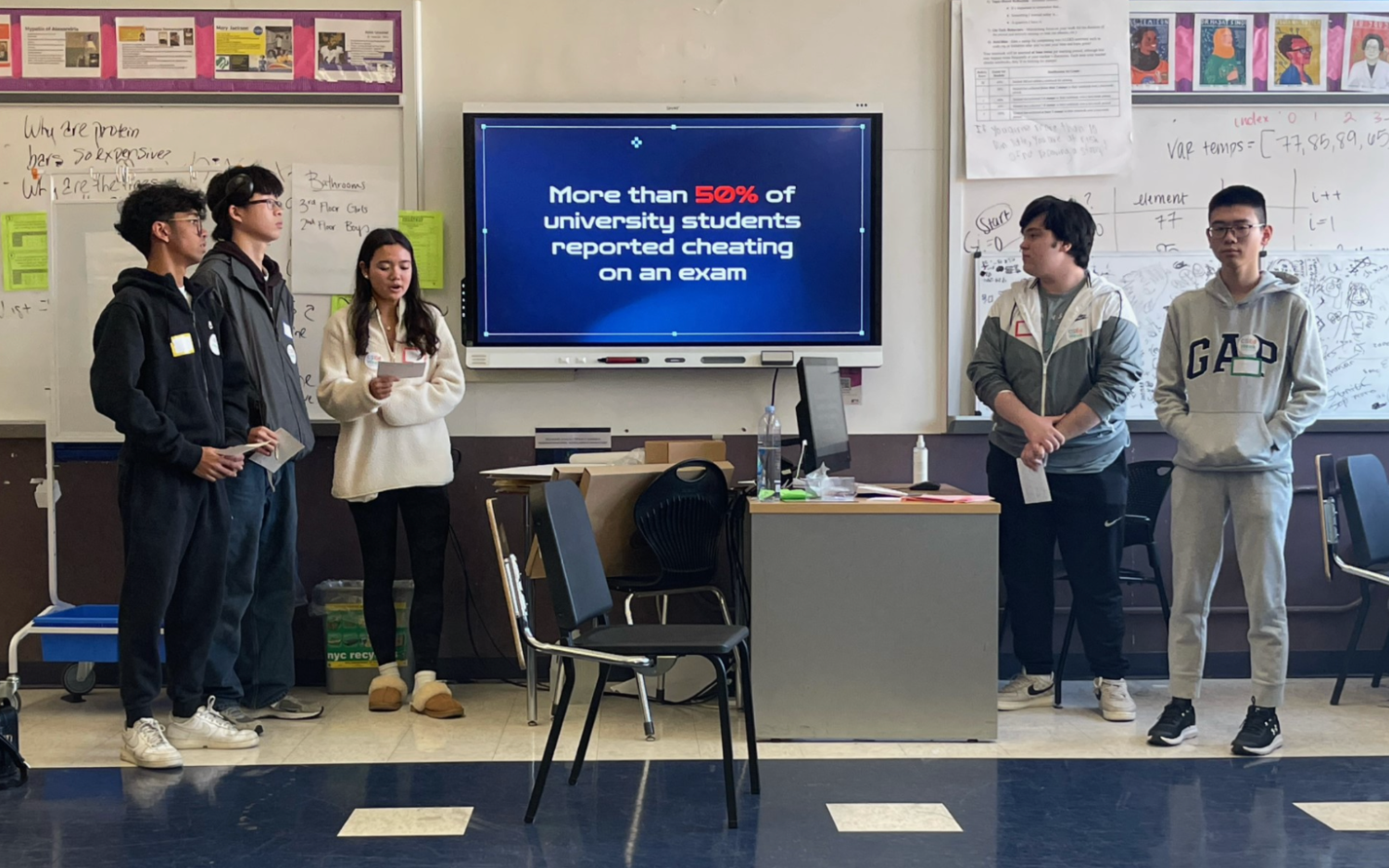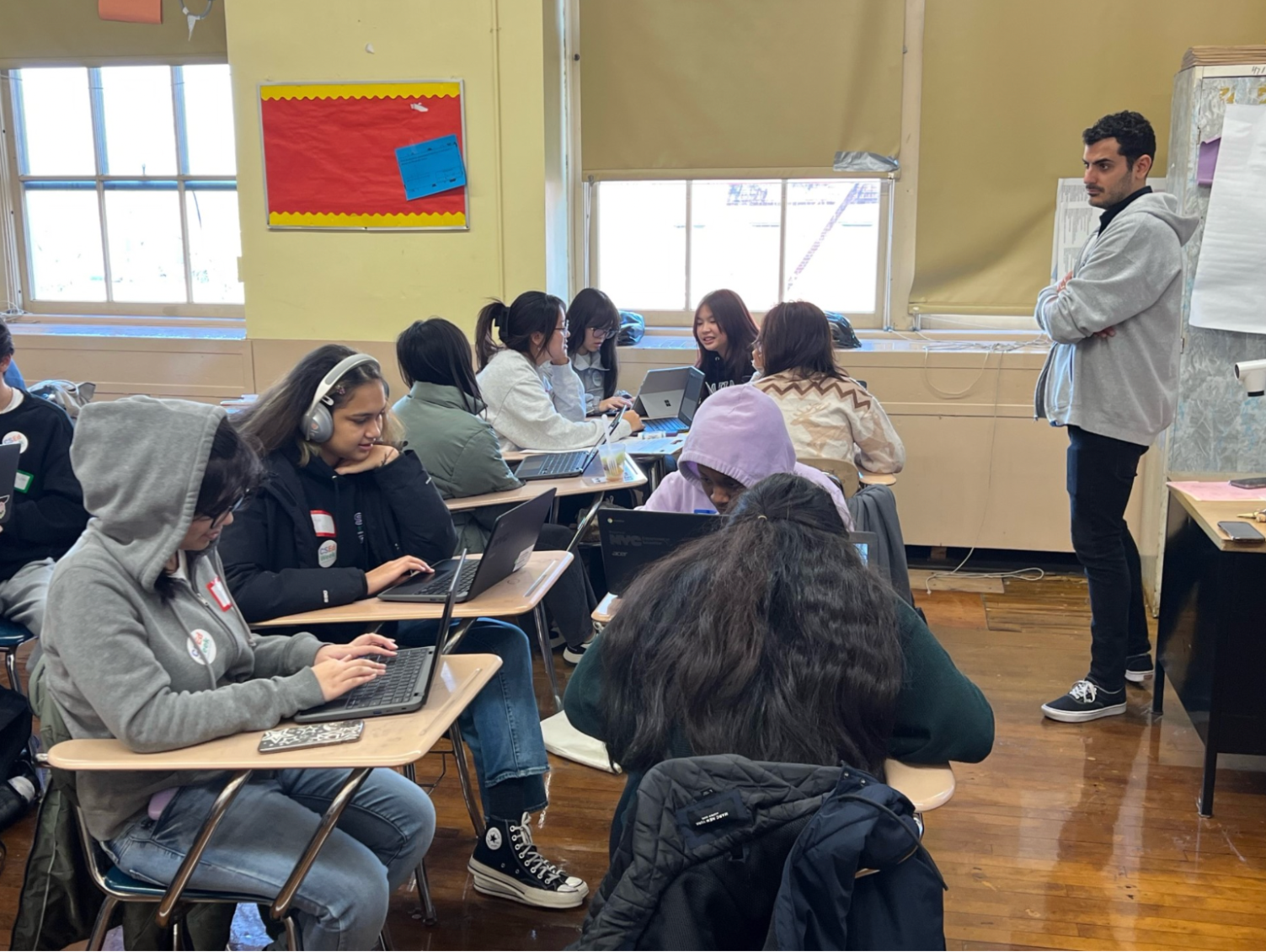Hackathon Taps AI to Find Modern Solutions
AIGuard, one of the winning teams, envisioned a camera that harnesses AI to prevent cheating on standardized tests. Photo: The Real Midwood High School (Facebook)
By SAFOWANA ISLAM
Midwood’s computer lab was flooded with coders from every grade level as they battled each other during the 6th Annual Wendy Menard Memorial Hackathon on December 11. This was the largest turnout in the competition’s history, with almost a hundred students in attendance.
This year, participants were put on a ticking four-hour clock and challenged with using artificial intelligence (AI) to solve a world issue.
“We thought this year’s [theme] was particularly timely,” said Mr. Samuel Keener, one of the Hackathon judges. “AI is all over the place, and many students are excited and concerned about the power of this relatively new technology. It was fun to see students’ different ideas about AI and the projects they came up with.”
After the tireless hours, “AIGuard” and “Biblo” persevered in becoming this year’s winning teams.
Juniors Lela Tu, Elion Ruci, Whaley Lin, Raymond Chen, and Alif Prodhan united together in building AIGuard, which is shorthand for “Academic Integrity Guard,” a camera they designed in order to detect unnatural movements that point toward cheating on tests.
“Standardized tests are a huge part of our lives,” said Ruci. “They give us qualifications for schools and jobs we might need. But many people cheat during these tests, which simply disrupts the balance and gives the cheaters unfair advantages.”
“We brainstormed a lot of ideas,” said Prodhan, “but we thought this was the best and most useful one.”
AIGuard’s project wasn’t the only one centered around academics. Biblo, which was led by Philip Kim ‘25, Lena Li ‘24, and Rasul Mohammad ‘24, was created to make classroom assignments more efficient.
Biblo is an AI learning platform that educators can digitally use to customize lessons and homework based on the preferences and interests of their students.
“Both AIGuard and Biblo had novel ideas with excellent presentations,” said Mr. Keener. “Their projects were highly developed and addressed issues of accessibility and equity. We thought they did a great job coming up with something that hasn’t been done before.”
Ms. Janet Gillespie, another Hackathon judge, said, “AIGuard had some really unique thoughts and a pretty well-developed plan, as did Biblo. This caused them to stand out from the rest.”
The Hackathon prompt left a lot to the imagination. “Honestly, since the prompt was fairly vague, the only hard thing was creating an idea,” said Ruci.
Prodhan said, “It was difficult to come to a consensus [because] we all came up with different things.”
The event’s turnout has grown every year since its inception. The large number of participants necessitated them being split up into three different rooms for presentations.
“It would have been great for all students and judges to see all the presentations, but logistically it would not have been possible with so many groups,” said Mr. Keener.
Even so, the presentations stood out as many of the students’ favorite part of the competition.
Daisy Vazquez ‘25 said, “Presenting the outline for the slides was a wonderful experience. It represented all the hard work that we accomplished in such a short time.”
Chen said, “Being able to organize a presentation where each member [of the team] was assigned a role was probably the greatest highlight as it allowed us to get things done efficiently.”
Mohammed said, “It felt good to be able to show off a product that we worked hard on for four hours.”
“All the students put so much effort and enthusiasm into their projects that we wanted to award all of them,” said Mr. Keener.
Though not every team was able to win, that didn’t undermine the learning lessons that come with the event.
“Hackathon was difficult but rewarding,” said Wan Yin Wu ‘25, a member of “Reer,” which received an honorable mention. “We learned how to collaborate and use everyone’s strengths under a pressing time limit to create a project that we were proud of.”
“Even though I didn’t win, I think I’m going to continue attending,” said Atiqa Ullah ‘25. “I genuinely valued how hard the prompt was and seeing how creative I could get.”
Like many participants, this was Ullah’s first time. Hackathon served as the gateway for students to take their first steps into the computer science realm.
Ms. Gillespie said, “Hackathon is a nice way to try and open up that world to students who haven’t thought about it as a potential path, because it doesn’t require any past coding knowledge.”
“Students develop so many skills [from Hackathon] that are extremely important in many careers and in life,” said Mr. Keener.
Later in the Spring, AIGuard and Biblo are going to continue their journey by competing in the EmotiCon Competition. Those two teams will also be joined by “Asoni,” the winning team from last year.
Once again, the Hackathon has left a lasting mark on many of the students and the judges, making them excited to return next year.
Ms. Gillespie said, “I would love to see us actually get over a hundred students next year. We were very close this year, so I have high hopes for the future.”
Spread across various rooms to accommodate the turnout, teams began by researching their projects. Photo: The Real Midwood High School (Facebook)


